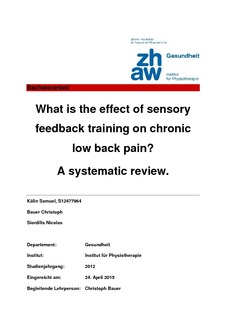Please use this identifier to cite or link to this item:
https://doi.org/10.21256/zhaw-1008Full metadata record
| DC Field | Value | Language |
|---|---|---|
| dc.contributor.advisor | Bauer, Christoph | - |
| dc.contributor.author | Kälin, Samuel | - |
| dc.date.accessioned | 2015-08-21T07:28:21Z | - |
| dc.date.available | 2015-08-21T07:28:21Z | - |
| dc.date.issued | 2015 | - |
| dc.identifier.uri | https://digitalcollection.zhaw.ch/handle/11475/1008 | - |
| dc.description.abstract | Study design: Systematic review and qualitative narrative synthesis. Objective: To evaluate if sensory feedback training (SFT) decreases the outcomes pain and function. Summary of Background Data: The studies that were integrated have used different kind of sensory feedback training. Methods: A systematic search was performed on the databases MEDLINE, PubMed, CINAHL and Embase, and was completed by screening the references of the records. Randomised controlled trials comparing SFT with other interventions, no treatment or sham therapy in patients with chronic low back pain were included. The outcomes for pain and function were extracted and analysed qualitatively. Results: The search revealed 42 records of which 6 fulfilled the inclusion criteria. These studies included 7 groups that, after having received SFT, all show a decreasing effect for pain and function, 3 groups fulfil the minimal clinically important difference (MCID), whereas there is one in the compared groups. Conclusion: Although the SFT groups reported a reduction in pain and function, the results were either not significant or did not correspond to the MCID. Study limitations render firm conclusions unsafe. | en |
| dc.description.abstract | Study design: Systematic review and qualitative narrative synthesis. Objective: To evaluate if sensory feedback training (SFT) decreases the outcomes pain and function. Summary of Background Data: The studies that were integrated have used different kind of sensory feedback training. Methods: A systematic search was performed on the databases MEDLINE, PubMed, CINAHL and Embase, and was completed by screening the references of the records. Randomised controlled trials comparing SFT with other interventions, no treatment or sham therapy in patients with chronic low back pain were included. The outcomes for pain and function were extracted and analysed qualitatively. Results: The search revealed 42 records of which 6 fulfilled the inclusion criteria. These studies included 7 groups that, after having received SFT, all show a decreasing effect for pain and function, 3 groups fulfil the minimal clinically important difference (MCID), whereas there is one in the compared groups. Conclusion: Although the SFT groups reported a reduction in pain and function, the results were either not significant or did not correspond to the MCID. Study limitations render firm conclusions unsafe. | de_CH |
| dc.language.iso | de | de_CH |
| dc.publisher | ZHAW Zürcher Hochschule für Angewandte Wissenschaften | de_CH |
| dc.rights | Licence according to publishing contract | de_CH |
| dc.subject | Chronic low back pain | de_CH |
| dc.subject | Physiotherapy | de_CH |
| dc.subject | Sensory feedback training | de_CH |
| dc.subject | Tactile stimulation | de_CH |
| dc.subject | Systematic review | de_CH |
| dc.subject.ddc | 615.82: Physiotherapie | de_CH |
| dc.title | What is the effect of sensory feedback training on chronic low back pain? : A systematic review. | de_CH |
| dc.type | Thesis: Bachelor | de_CH |
| dcterms.type | Text | de_CH |
| zhaw.departement | Gesundheit | de_CH |
| dc.identifier.doi | 10.21256/zhaw-1008 | - |
| zhaw.originated.zhaw | Yes | de_CH |
| Appears in collections: | Abschlussarbeiten Physiotherapie | |
Files in This Item:
| File | Description | Size | Format | |
|---|---|---|---|---|
| kaelin_samuel_PT12_PT92.pdf | 298.34 kB | Adobe PDF |  View/Open |
Show simple item record
Kälin, S. (2015). What is the effect of sensory feedback training on chronic low back pain? : A systematic review. [Bachelor’s thesis, ZHAW Zürcher Hochschule für Angewandte Wissenschaften]. https://doi.org/10.21256/zhaw-1008
Kälin, S. (2015) What is the effect of sensory feedback training on chronic low back pain? : A systematic review. Bachelor’s thesis. ZHAW Zürcher Hochschule für Angewandte Wissenschaften. Available at: https://doi.org/10.21256/zhaw-1008.
S. Kälin, “What is the effect of sensory feedback training on chronic low back pain? : A systematic review.,” Bachelor’s thesis, ZHAW Zürcher Hochschule für Angewandte Wissenschaften, 2015. doi: 10.21256/zhaw-1008.
KÄLIN, Samuel, 2015. What is the effect of sensory feedback training on chronic low back pain? : A systematic review. Bachelor’s thesis. ZHAW Zürcher Hochschule für Angewandte Wissenschaften
Kälin, Samuel. 2015. “What is the effect of sensory feedback training on chronic low back pain? : A systematic review.” Bachelor’s thesis, ZHAW Zürcher Hochschule für Angewandte Wissenschaften. https://doi.org/10.21256/zhaw-1008.
Kälin, Samuel. What is the effect of sensory feedback training on chronic low back pain? : A systematic review. ZHAW Zürcher Hochschule für Angewandte Wissenschaften, 2015, https://doi.org/10.21256/zhaw-1008.
Items in DSpace are protected by copyright, with all rights reserved, unless otherwise indicated.